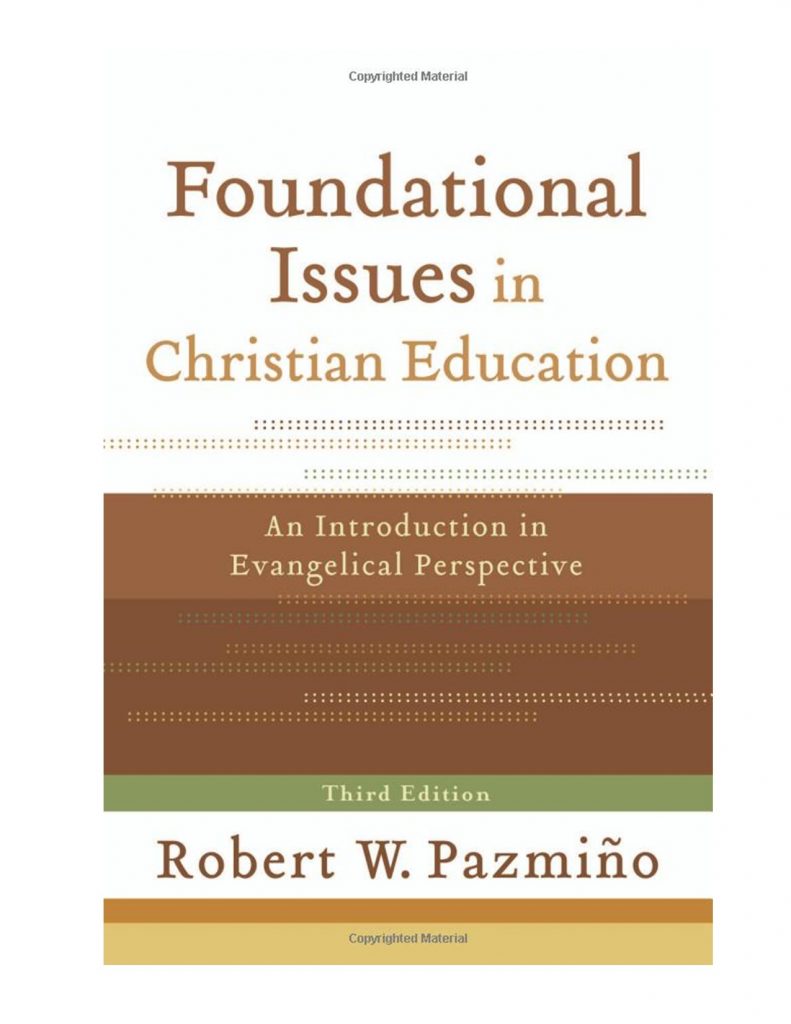Book Review of “Foundational Issues in Christian Education” by Robert W. Pazmino
This is an interesting book on Christian education. Early in the book, the author says, “In the ultimate sense, God is the teacher in Biblical Education. God is the author and discloser of all truth and both teachers and students alike stand under this truth” (Pg. 22. Baker Academic. 2008.). He goes on to say, “Teachers are responsible as stewards and proclaimers of God’s truth” (Ibid). As disciple-makers, we are in fact teachers, so it is very important for us to understand the role of God as the ultimate teacher in our discipleship plan. Earlier in this chapter, the author writes:
“Scripture is the essential source for understanding distinctively Christian elements in education. Therefore it is crucial that the Christian educator’s thoughts and practices be guided by God’s revealed truths as he or she seeks to be obedient to Christ in the task of education” (19).

The author makes an interesting note about Augustine in relation to bringing hope through teaching. He says, “In response to the lack of faithful living, the prophets in their teaching bring a message of hope, anger and courage that the great North African teacher Augustine described: ‘Hope has two lovely daughters anger and courage. Anger at the way things are, and courage to see that they need not remain as they are” (33-34) It seems teachers and disciple makers have a very important role and have a lot of influence with people. A little later, the author says, “The purpose of making disciples is totally dependent on sharing the content of Jesus’s own teachings, those truths revealed by God with direct implications for life” (35).
One of the foundations. Pazmino writes:
“Philosophy can be literally defined as, ‘the love of wisdom.’ Christians are reminded in scripture that it is the Lord who gives wisdom and that from his mouth come knowledge and understanding (Prov. 2:6), and that the fear of the Lord is the beginning of knowledge or wisdom (Prov. 1:7, 9:10)” (86).
After setting up the foundation of philosophy, and how it leads to knowledge, the author talks about the importance of getting a good education. Experience is important, but we can’t ignore a good education and simply rely on experience. He talks about a proverb, “Experience is the best teacher but is the school of a fool.” And “Experience is a dear school but fools will learn in no other.” And finally, “Experience is not sufficient for education” (88). I really like this. It’s a great reminder to us that we should never try to go it alone when it comes to teaching. A disciple maker needs the local church, and should never try to be a “lone ranger” without the backing of the local church. We may have a lot of experience, but a solid Biblical education is so important, and if we don’t have that (or even if we do) we don’t just go it all alone.
Another great point I really like has to do with learning from history. I have always been interested in church history, and especially early church history. We can learn a great deal from looking at how the early church handled discipleship. The author wrote, “Christians can learn from the past to gain insights for current and future needs” (129).
The author has a lot to say about several other great topics when considering education and discipleship. At one time I was the Sunday School superintendent for a large church. Some of our teachers insisted they didn’t need to use the curriculum the church was providing, because they felt more comfortable teaching their own material, i.e. they would study and put together something for themselves each Sunday. Unfortunately, we started getting complaints that a particular teacher was not very good. He was a great guy, friendly, and had a heart for kids, but the kids were not getting anything out of his class. We had a sit-down and asked him to reconsider using the curriculum. We told him to try using the Sunday school curriculum for one quarter, and if he still thought he would rather do his own thing, we could readdress it then. Well, this teacher went from having one of the worst reviews to one of the best. Using the material the church provided made him a better teacher. This example doesn’t mean that there are no exceptions, but generally speaking good curriculum will make all the difference. The author writes on this subject, “Curriculum is the vehicle or the medium through which educational vision takes root” (234).
I would recommend this book to pastors, teachers, and anyone looking to be a disciple-maker. It has a lot of good insight and food for thought. In seeking knowledge, this is a good book to open ministry to bring an understanding of some of the principles of education. In practical terms, spiritual formation is something better taught using the wisdom and knowledge of experts in the field.
Leave a Reply